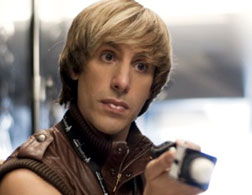Whipping Boy
Sacha Baron Cohen's Brüno arrives on our shores.
In Culturebox, Dennis Lim contends that after Brüno Hollywood depictions of gays may never be the same. After you've seen Brüno, come back and listen to our Spoiler Special discussion of Baron Cohen's latest squirmfest:
You can also click hereto download the MP3, or you'll find this and dozens of other Spoiler Specials in our iTunes podcast feed here.
Because Sacha Baron Cohen's comedy is so conceptual and his methods so extreme, it's become common wisdom that his elaborate hoaxes are part of some larger mission to expose American racism and homophobia. But Baron Cohen's comic truth seems simpler (and more pathological) than that: He will do anything for a laugh, and we will pay $10.75 to watch him do it. In Borat (2006), this Cambridge-educated British comedian brought a bag of his own feces to a dinner party and wrestled nude with his obese sidekick, the eternally game Ken Davitian. In Brüno (Universal Pictures), Baron Cohen has his anal hair bleached, sprints through an Orthodox neighborhood in Jerusalem wearing Hasidic side curls and booty shorts, makes a painfully extended pass at libertarian presidential candidate Ron Paul, does the Nazi salute at an Army boot-camp training session, and allows his penis to be animated in stop motion so that it appears to shout out his character's name. Baron Cohen's comedy takes place at some weird intersection between avant-garde performance piece and frat-house dare. When laughing at his most outrageous gags, you don't know whether you're howling in shock, fear, disbelief, or delight. The trick to enjoying his movies is not to care too much.
Brüno is the buff-bodied, self-adoring, and supremely vacuous host of an Austrian fashion program, Funkyzeit. As the film begins, he and his boyfriend, a "pygmy flight attendant," demonstrate their domestic bliss in a montage of comically extreme sexual practices involving … well, I'll let you witness their unusual props for yourself. After ruining a Milan fashion show by stumbling into a wardrobe rack wearing a Velcro suit, Brüno is schwarzlisted in Austria. When his TV show is canceled, he's spurned by his pygmy lover. So he sets off to find fame in the United States, trailed by his besotted assistant Lutz. (Played by Gustaf Hammarsten, a Swedish actor who's just as fine here as he was in the great Lukas Moodysson film Together.)
Brüno's transcontinental journey is nearly identical in structure to that of his Kazakh predecessor, Borat. Starting in L.A. (where he procures an agent and pitches a talk show called A-List Celebrity Maxout mit Brüno), Brüno makes his way to the Deep South, the site of the movie's climactic set piece—a wrestling cage match, designed for maximum crowd provocation, that's the exact equivalent of Borat's cathartic rodeo scene. (Brüno's cross-country trip is interrupted by a jaunt to the Middle East, where he sits down with prominent Israeli and Palestinian figures and gets them to agree that hummus is a tasty and nutritious food).
Still, the humor of Brüno is arguably crueler and more misanthropic than Borat's. Borat, for all his backwardness and provincial racism, was a character who elicited the audience's sympathy. There was something sweet about his eagerness to connect, however inappropriately, to everyone he met on his travels. Brüno is harder to take, a preening, grating parody not only of the swishy gay fashionista ("Dolce and Gabbana? Hellooo?") but of the soulless and fame-hungry arriviste. Eighty-two minutes in his company is enough, but they pass pretty quickly when you're laughing every 15 seconds. I'll leave the question of whether Brüno is good or bad for the gays to those smarter (and gayer) than me and just say that to storm out of the movie in a huff is to fall into the same trap Baron Cohen sets for Ron Paul, Paula Abdul, and the focus-group audience of A-List Celebrity Maxout.
SBC's humor is sadistic, yes. To get laughs, he depends on the production of extreme discomfort in both his marks and his audience. But it's also masochistic: This is a man who clearly delights in making himself the target of opprobrium, humiliation, and even violence. A scene at a swingers' party, in which a trying-to-go-straight Brüno is chased around and beaten by a blond dominatrix, is the closest Baron Cohen comes to breaking character and laughing. The high point of Brüno, for me, came during Brüno's camping trip with some less-than-tolerant hunters. As they sit around the campfire, Brüno gazes up at the starry sky and murmurs, "Makes you think of all the hot guys in the world, doesn't it?" What follows is a good 20 seconds of absolute silence, during which the only thing more palpable than the hunters' disgust is Baron Cohen's pleasure. In such scenes, you find yourself fearing for the actor's physical safety and wondering what would happen if, God forbid, he were to punk the wrong redneck one day and get himself seriously hurt, or worse. In a strange way, though, I think Baron Cohen was half-hoping the hunters would go for their guns (which, according to the production notes, they refused to unload during the shoot.) If they'd shot him, I wonder if he would have died in character.
Slate V: The critics on Brüno and other new movies

